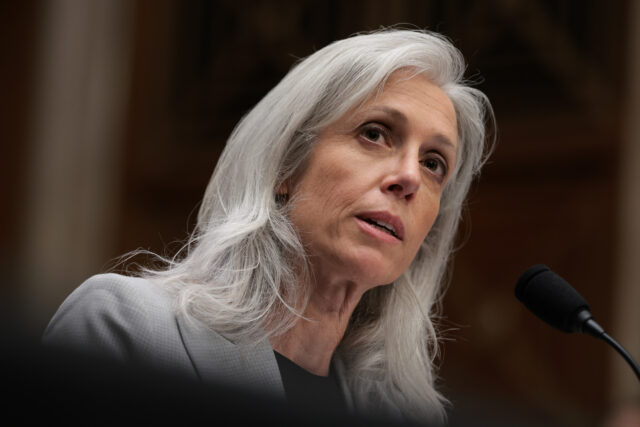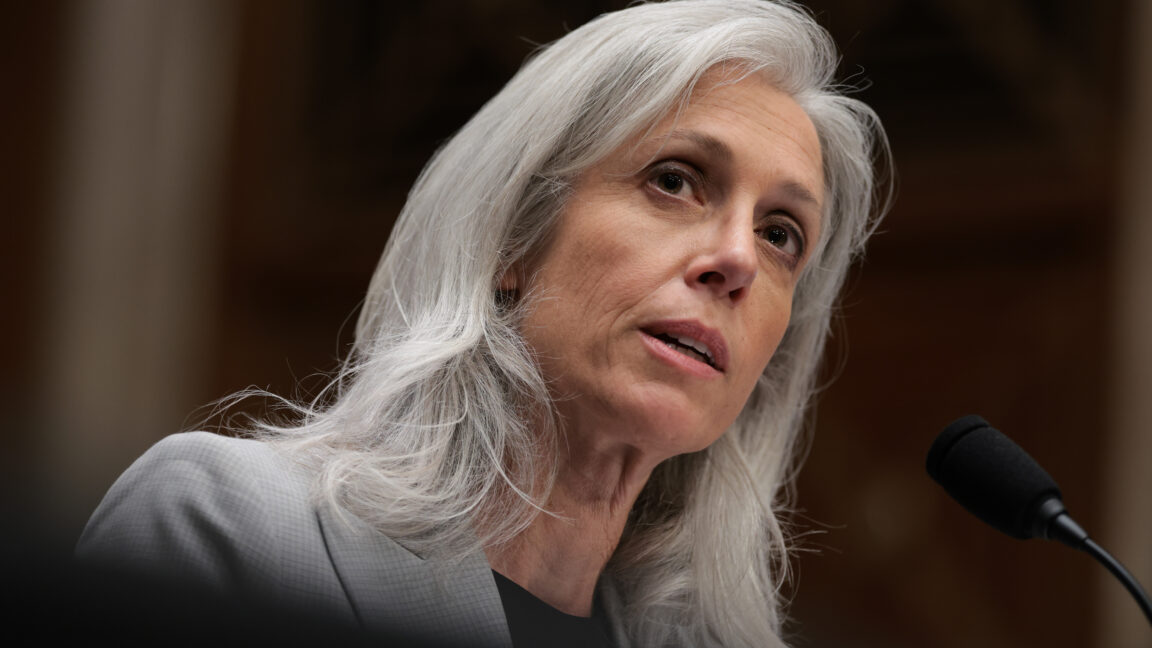- Регистрация
- 17 Февраль 2018
- Сообщения
- 38 917
- Лучшие ответы
- 0
- Реакции
- 0
- Баллы
- 2 093
Offline
Monarez aligned with evidence-based public health community and had support of experts.


Susan Monarez, President Donald Trump’s nominee to be the Director of the Centers for Disease Control and Prevention (CDC), testifies during her confirmation hearing before the Senate Committee on Health, Education, Labor, and Pensions in the Dirksen Senate Office Building on June 25, 2025 in Washington, DC. Credit: Getty | Kayla Bartkowski
Just weeks after being confirmed by the Senate, Susan Monarez has been ousted from the now thoroughly battered public health agency.
The news was first reported by The Washington Post, which cited multiple officials within the Trump administration. After Ars Technica contacted the Department of Health and Human Services for confirmation of the ouster, HHS responded with a link to a post on the department's X account. The post states:
Susan Monarez is no longer director of the Centers for Disease Control and Prevention. We thank her for her dedicated service to the American people. @SecKennedy has full confidence in his team at @CDCgov who will continue to be vigilant in protecting Americans against infectious diseases at home and abroad.
The department did not address the circumstances surrounding Monarez's ouster. But reporting from The New York Times suggests that she had clashed with US Health Secretary and fervent anti-vaccine advocate Robert F. Kennedy Jr. by objecting to his changes on the panel of experts that advise the CDC on vaccine policy.
Monarez was confirmed by the Senate at the end of July in a 51–47 vote along party lines. She was the first nominee for CDC director that was required to go through Senate confirmation following a law mandating it in 2022.
Kennedy swore Monarez into the role on July 31, saying in a statement, "Dr. Monarez is a public health expert with unimpeachable scientific credentials. I have full confidence in her ability to restore the CDC’s role as the most trusted authority in public health and to strengthen our nation's readiness to confront infectious diseases and biosecurity threats."
Monarez has a PhD in microbiology and immunology and previously served as the deputy director for the Advanced Research Projects Agency for Health (ARPA-H) under the Biden administration. She also previously held leadership and advisory roles with Biomedical Advanced Research and Development Authority (BARDA) at HHS, the Department of Homeland Security, the White House’s Office of Science and Technology Policy, and the National Security Council.
A low point for the agency
As Ars has reported previously, Monarez quietly helmed the CDC as acting director from January to March of this year but stepped down as required when Donald Trump nominated her for the permanent role. She was Trump's second nominee for the role, with the first being Dave Weldon, whose nomination was abandoned over concerns about his anti-vaccine views.
Monarez offered a welcome contrast, as her views generally align with the evidence-based public health community, and she has earned support from experts in the field. Jennifer Nuzzo, director of the Pandemic Center at the Brown University School of Public Health, told NPR at the time of her confirmation that Monarez is "a loyal, hardworking civil servant who leads with evidence and pragmatism and has been dedicated to improving the health of Americans for the entirety of her career."
Georges Benjamin, executive director of the American Public Health Association, told the outlet that Monarez "values science, is a solid researcher, and has a history of being a good manager. We're looking forward to working with her."
The reported ouster comes at what feels like a nadir for the CDC. The agency has lost hundreds of staff from layoffs and buyouts. Vital health programs have been shuttered or hampered. Dangerous rhetoric and health misinformation from Kennedy and other health officials in the Trump administration have made once-respected CDC experts feel vilified by the public and targets of hate. Kennedy himself has falsely called the COVID-19 shots the "deadliest vaccine ever made" and the CDC a "cesspool of corruption," for example.
On August 8, a gunman warped by vaccine disinformation opened fire on the CDC campus. Of nearly 500 shots fired, about 200 struck six CDC buildings as terrified staff dove for safety. One local police officer was killed in the incident. The gunman had specifically targeted the CDC for the shooting and blamed COVID-19 vaccines for his health problems.
Additional Exits reported
After news broke of Monarez's removal, Stat News reported that a wave of CDC leadership has resigned. The high ranking resignations include: Daniel Jernigan, director of the National Center for Emerging Zoonotic Infectious Diseases; Deb Houry, Chief Medical Officer; and Demetre Daskalakis, director of the National Center for Immunization and Respiratory Diseases.
"I am not able to serve in this role any longer because of the ongoing weaponization of public health," Daskalakis said in a message to staff seen by Stat.
"I am committed to protecting the public’s health, but the ongoing changes prevent me from continuing in my job as a leader of the agency," Houry wrote in message to staff. Houry added that science should "never be censored or subject to political interpretations."
Earlier today, Politico reported that Jennifer Layden, director of the agency’s Office of Public Health Data, Surveillance, and Technology, has also resigned.
This post has been updated to include the social media post from HHS, reporting from the New York Times on the circumstances around Monarez's exit, and additional resignations reported by Stat and Politico.


Susan Monarez, President Donald Trump’s nominee to be the Director of the Centers for Disease Control and Prevention (CDC), testifies during her confirmation hearing before the Senate Committee on Health, Education, Labor, and Pensions in the Dirksen Senate Office Building on June 25, 2025 in Washington, DC. Credit: Getty | Kayla Bartkowski
Just weeks after being confirmed by the Senate, Susan Monarez has been ousted from the now thoroughly battered public health agency.
The news was first reported by The Washington Post, which cited multiple officials within the Trump administration. After Ars Technica contacted the Department of Health and Human Services for confirmation of the ouster, HHS responded with a link to a post on the department's X account. The post states:
Susan Monarez is no longer director of the Centers for Disease Control and Prevention. We thank her for her dedicated service to the American people. @SecKennedy has full confidence in his team at @CDCgov who will continue to be vigilant in protecting Americans against infectious diseases at home and abroad.
The department did not address the circumstances surrounding Monarez's ouster. But reporting from The New York Times suggests that she had clashed with US Health Secretary and fervent anti-vaccine advocate Robert F. Kennedy Jr. by objecting to his changes on the panel of experts that advise the CDC on vaccine policy.
Monarez was confirmed by the Senate at the end of July in a 51–47 vote along party lines. She was the first nominee for CDC director that was required to go through Senate confirmation following a law mandating it in 2022.
Kennedy swore Monarez into the role on July 31, saying in a statement, "Dr. Monarez is a public health expert with unimpeachable scientific credentials. I have full confidence in her ability to restore the CDC’s role as the most trusted authority in public health and to strengthen our nation's readiness to confront infectious diseases and biosecurity threats."
Monarez has a PhD in microbiology and immunology and previously served as the deputy director for the Advanced Research Projects Agency for Health (ARPA-H) under the Biden administration. She also previously held leadership and advisory roles with Biomedical Advanced Research and Development Authority (BARDA) at HHS, the Department of Homeland Security, the White House’s Office of Science and Technology Policy, and the National Security Council.
A low point for the agency
As Ars has reported previously, Monarez quietly helmed the CDC as acting director from January to March of this year but stepped down as required when Donald Trump nominated her for the permanent role. She was Trump's second nominee for the role, with the first being Dave Weldon, whose nomination was abandoned over concerns about his anti-vaccine views.
Monarez offered a welcome contrast, as her views generally align with the evidence-based public health community, and she has earned support from experts in the field. Jennifer Nuzzo, director of the Pandemic Center at the Brown University School of Public Health, told NPR at the time of her confirmation that Monarez is "a loyal, hardworking civil servant who leads with evidence and pragmatism and has been dedicated to improving the health of Americans for the entirety of her career."
Georges Benjamin, executive director of the American Public Health Association, told the outlet that Monarez "values science, is a solid researcher, and has a history of being a good manager. We're looking forward to working with her."
The reported ouster comes at what feels like a nadir for the CDC. The agency has lost hundreds of staff from layoffs and buyouts. Vital health programs have been shuttered or hampered. Dangerous rhetoric and health misinformation from Kennedy and other health officials in the Trump administration have made once-respected CDC experts feel vilified by the public and targets of hate. Kennedy himself has falsely called the COVID-19 shots the "deadliest vaccine ever made" and the CDC a "cesspool of corruption," for example.
On August 8, a gunman warped by vaccine disinformation opened fire on the CDC campus. Of nearly 500 shots fired, about 200 struck six CDC buildings as terrified staff dove for safety. One local police officer was killed in the incident. The gunman had specifically targeted the CDC for the shooting and blamed COVID-19 vaccines for his health problems.
Additional Exits reported
After news broke of Monarez's removal, Stat News reported that a wave of CDC leadership has resigned. The high ranking resignations include: Daniel Jernigan, director of the National Center for Emerging Zoonotic Infectious Diseases; Deb Houry, Chief Medical Officer; and Demetre Daskalakis, director of the National Center for Immunization and Respiratory Diseases.
"I am not able to serve in this role any longer because of the ongoing weaponization of public health," Daskalakis said in a message to staff seen by Stat.
"I am committed to protecting the public’s health, but the ongoing changes prevent me from continuing in my job as a leader of the agency," Houry wrote in message to staff. Houry added that science should "never be censored or subject to political interpretations."
Earlier today, Politico reported that Jennifer Layden, director of the agency’s Office of Public Health Data, Surveillance, and Technology, has also resigned.
This post has been updated to include the social media post from HHS, reporting from the New York Times on the circumstances around Monarez's exit, and additional resignations reported by Stat and Politico.
